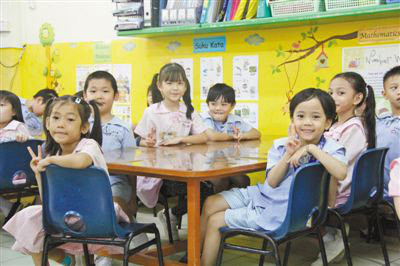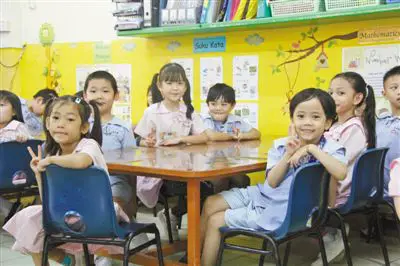By Ding Zi, Wang Fang, Sun Guangyong, Lin Rui from People’s Daily

China and Brunei have braced for an upsurge of people-to-people and cultural exchanges in recent years, which can be illustrated by the increasing Chinese tourists in Brunei, more youth exchange programs, closer city ties, intensified think-tank communication, as well as local citizens’ passion to learn Chinese language.
In 2017, about 52,000 Chinese tourists arrived in Brunei for travelling, hitting a record high and making China the largest tourist source of the Southeast Asian country.
China has risen to a global leader in terms of aviation and aerospace, machinery and equipment as well as infrastructure, and the professional talents trained by China are popular in Brunei, said Lim Peh Beng, President of Chinese Chamber of Commerce of Bandar Seri Begawan, capital city of Brunei.
A training program jointly launched by China’s Zhejiang-based Hengyi Petrochemical Co. Ltd, a producer of chemical fibers and chemical fiber raw materials, Zhejiang University, and the University Brunei Darussalam has fostered a total of 68 Brunei undergraduates in five batches. 26 of them have begun their career in Hengyi’s Brunei branch after finishing their studies.
Liyana, who just concluded her learning program, told the People’s Daily that she gets a lot from the training since China has advanced petrochemical technologies, and she feels proud of working for a China-funded company currently.
The two countries also have launched more youth exchange projects in recent years. Chinese Embassy in Brunei, for instance, has organized batches of young government officials to engage in an "Experience China" cultural event series starting from 2016.
The delegation members visited China’s governmental departments and high-tech zones, communicated with scholars of think-tanks, and also toured cultural relics to experience China’s history and culture. .
In 2011, China’s Nanjing became Brunei’s first sister city with other countries after it concluded an agreement with Bandar Seri Begawan. Representatives of Brunei’s mainstream media, including state broadcaster Radio Television Brunei and Borneo Bulletin, have paid several friendly visits to China in recent years.
The scholars and think-tanks have also maintained in-depth exchange of views on how to deepen China’s ties with Brunei and the Association of Southeast Asian Nations (ASEAN).
More and more residents in Brunei are aspiring to learn Chinese. Chung Hwa Middle School, the largest Chinese-language school in Brunei, has enrolled over 2,300 students.
Praising China’s remarkable achievements in its leapfrog economic and social development over the past 40 years since reform and opening up, Lim Boon Hwa, executive chairman of the school, said that local residents are optimistic about China’s future and more parents send their children to learn Chinese language, in the hope that they could seek future development in China.
In 2017, about 52,000 Chinese tourists arrived in Brunei for travelling, hitting a record high and making China the largest tourist source of the Southeast Asian country.
China has risen to a global leader in terms of aviation and aerospace, machinery and equipment as well as infrastructure, and the professional talents trained by China are popular in Brunei, said Lim Peh Beng, President of Chinese Chamber of Commerce of Bandar Seri Begawan, capital city of Brunei.
A training program jointly launched by China’s Zhejiang-based Hengyi Petrochemical Co. Ltd, a producer of chemical fibers and chemical fiber raw materials, Zhejiang University, and the University Brunei Darussalam has fostered a total of 68 Brunei undergraduates in five batches. 26 of them have begun their career in Hengyi’s Brunei branch after finishing their studies.
Liyana, who just concluded her learning program, told the People’s Daily that she gets a lot from the training since China has advanced petrochemical technologies, and she feels proud of working for a China-funded company currently.
The two countries also have launched more youth exchange projects in recent years. Chinese Embassy in Brunei, for instance, has organized batches of young government officials to engage in an "Experience China" cultural event series starting from 2016.
The delegation members visited China’s governmental departments and high-tech zones, communicated with scholars of think-tanks, and also toured cultural relics to experience China’s history and culture. .
In 2011, China’s Nanjing became Brunei’s first sister city with other countries after it concluded an agreement with Bandar Seri Begawan. Representatives of Brunei’s mainstream media, including state broadcaster Radio Television Brunei and Borneo Bulletin, have paid several friendly visits to China in recent years.
The scholars and think-tanks have also maintained in-depth exchange of views on how to deepen China’s ties with Brunei and the Association of Southeast Asian Nations (ASEAN).
More and more residents in Brunei are aspiring to learn Chinese. Chung Hwa Middle School, the largest Chinese-language school in Brunei, has enrolled over 2,300 students.
Praising China’s remarkable achievements in its leapfrog economic and social development over the past 40 years since reform and opening up, Lim Boon Hwa, executive chairman of the school, said that local residents are optimistic about China’s future and more parents send their children to learn Chinese language, in the hope that they could seek future development in China.
 Menu
Menu
 China, Brunei brace for upsurge of cultural exchanges
China, Brunei brace for upsurge of cultural exchanges
















